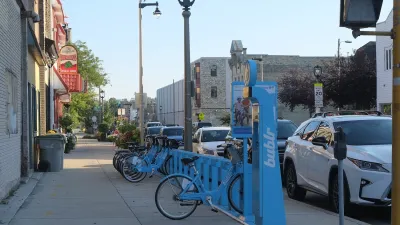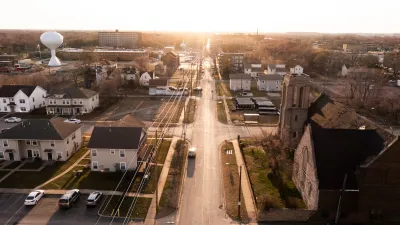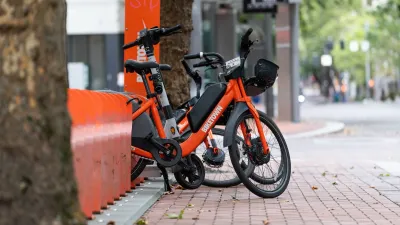While many big city bike-share systems hit potholes, one Czech city has experienced success with an entirely different – and more DIY – ‘micro-scheme’ approach fostered by a network of cafés.
“Buy a coffee, and we’ll lend you a free bike. This is the idea behind a novel kind of bike-share scheme in the Czech Republic,” writes Feargus O’Sullivan. “[A] group of cafes in Brno, the country’s second-largest city, have come together to offer customers free biking. Dropping in for a drink, all users need to do is put down a deposit of 300 Crown ($16) and they get a lock, a folding bike and a request to turn it in at the end of the day at any of the participating centers.”
“Major bike-share schemes typically involve major enterprises like Citibank and Barclays, but Brno’s participants are all small, local businesses – its hub is a café, bar and arts venue,” he notes. “While participants…need to take a long view, they clearly believe they can recoup their investment in a few bikes by encouraging more customers to buy drinks, by developing user loyalty and creating a city-wide publicity platform for themselves and the events they host.”
The system, which has experienced much popularity and very little theft or abuse, no-doubt benefits from some local conditions such as a tight-knit urban core, as well as loyal patrons and volunteers. While the system may not be replicable everywhere, it illustrates an altogether different and intriguing approach to bike-share, one without corporate sponsorship, new infrastructure, municipal involvement or public cash.
FULL STORY: Would You Like a Bike With That Coffee?

Alabama: Trump Terminates Settlements for Black Communities Harmed By Raw Sewage
Trump deemed the landmark civil rights agreement “illegal DEI and environmental justice policy.”

Planetizen Federal Action Tracker
A weekly monitor of how Trump’s orders and actions are impacting planners and planning in America.

The 120 Year Old Tiny Home Villages That Sheltered San Francisco’s Earthquake Refugees
More than a century ago, San Francisco mobilized to house thousands of residents displaced by the 1906 earthquake. Could their strategy offer a model for the present?

In Both Crashes and Crime, Public Transportation is Far Safer than Driving
Contrary to popular assumptions, public transportation has far lower crash and crime rates than automobile travel. For safer communities, improve and encourage transit travel.

Report: Zoning Reforms Should Complement Nashville’s Ambitious Transit Plan
Without reform, restrictive zoning codes will limit the impact of the city’s planned transit expansion and could exclude some of the residents who depend on transit the most.

Judge Orders Release of Frozen IRA, IIJA Funding
The decision is a victory for environmental groups who charged that freezing funds for critical infrastructure and disaster response programs caused “real and irreparable harm” to communities.
Urban Design for Planners 1: Software Tools
This six-course series explores essential urban design concepts using open source software and equips planners with the tools they need to participate fully in the urban design process.
Planning for Universal Design
Learn the tools for implementing Universal Design in planning regulations.
Clanton & Associates, Inc.
Jessamine County Fiscal Court
Institute for Housing and Urban Development Studies (IHS)
City of Grandview
Harvard GSD Executive Education
Toledo-Lucas County Plan Commissions
Salt Lake City
NYU Wagner Graduate School of Public Service





























